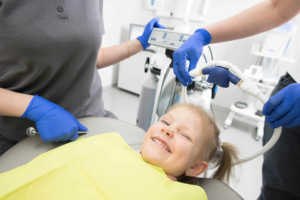
Dental implants have established themselves as a highly effective remedy for tooth loss in adults, but their application for children raises questions. In this article, we will delve into the scenarios where dental implants might be considered for children. We’ll also explore the various factors that come into play and underscore the significance of early intervention in pediatric dental care.
Understanding Dental Implants
Dental implants serve as artificial tooth roots, typically crafted from biocompatible materials like titanium or zirconia. Surgically implanted into the jawbone, these implants provide a stable foundation for prosthetic teeth such as crowns or bridges. Renowned for their durability, natural appearance, and ability to restore oral function effectively, dental implants have become a trusted solution.
Determining When Dental Implants Are Appropriate for Children
The decision to employ dental implants in children is multifaceted and hinges on various factors:
- Age: Dental implants are not a recommended option for very young children. This is because their jawbones are still in the active growth phase, which continues into their late teens. Consequently, dental implants are generally considered for teenagers who have completed their growth phase.
- Tooth Development: Children experience a continual process of tooth eruption and loss as they grow. In instances where a child loses a primary (baby) tooth prematurely, dental professionals may employ a space maintainer to preserve room for the permanent tooth to emerge naturally. Dental implants are typically contemplated for the replacement of permanent teeth.
- Emotional and Psychological Factors: A child’s emotional and psychological readiness is pivotal. Dental implant surgery is a significant procedure that demands comprehension and adherence to post-operative care instructions. Therefore, the child should be sufficiently mature to grasp the process and commit to the necessary care.
- Oral Health Conditions: Dental implant consideration may be extended to children with specific dental conditions or congenital abnormalities that hinder tooth development. Examples include conditions like ectodermal dysplasia, where permanent teeth may be absent or underdeveloped.
- Individual Case Evaluation: Every child’s situation is unique and merits a comprehensive evaluation by a pediatric dentist or oral surgeon. This assessment encompasses the child’s overall health, oral condition, and specific requirements, which serve as the foundation for any recommendations regarding dental implant placement.
The Significance of Early Intervention
Early intervention within the realm of pediatric dental care holds immense importance for several compelling reasons:
- Preventing Complications: Timely addressing of dental issues helps stave off complications and the potential for more extensive dental problems later in life.
- Maintaining Oral Function: Replacing missing teeth at an early stage empowers children to uphold proper oral function, which encompasses chewing, speaking, and overall well-being.
- Boosting Confidence: The restoration of a child’s smile can have a transformative impact on their self-esteem and confidence, positively influencing their social and emotional development.
- Natural Growth and Development: Early intervention aligns dental treatment with a child’s natural growth and development trajectory. This approach minimizes the need for complex procedures in the future.
Alternatives to Dental Implants for Children
In situations where dental implants are deemed inappropriate for children, several alternative approaches can be explored:
- Removable Dentures: Teenagers who are not suitable candidates for dental implants can opt for removable dentures. These dentures offer a temporary solution until they reach an age where dental implants become a viable option.
- Fixed Bridges: Fixed dental bridges provide an alternative means of replacing missing teeth. This method involves anchoring artificial teeth to adjacent natural teeth or dental crowns.
- Space Maintainers: Premature loss of primary teeth can be managed with the use of space maintainers, which serve to preserve the necessary space for the emergence of permanent teeth.
- Orthodontic Solutions: Orthodontic treatments can be deployed to address tooth misalignment or close gaps between teeth. These measures often eliminate the need for tooth replacement altogether, providing an effective alternative to dental implants.
Recommended post: 21 Tips to recover after a dental implant surgery

